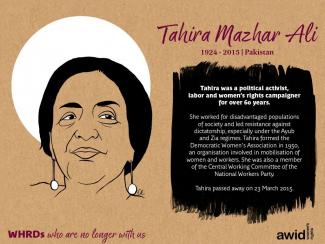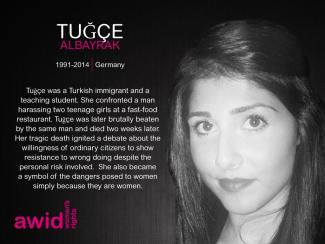
Tuğçe Albayrak


The “Where is the Money?” #WITM survey is now live! Dive in and share your experience with funding your organizing with feminists around the world.
Learn more and take the survey
Around the world, feminist, women’s rights, and allied movements are confronting power and reimagining a politics of liberation. The contributions that fuel this work come in many forms, from financial and political resources to daily acts of resistance and survival.
AWID’s Resourcing Feminist Movements (RFM) Initiative shines a light on the current funding ecosystem, which range from self-generated models of resourcing to more formal funding streams.
Through our research and analysis, we examine how funding practices can better serve our movements. We critically explore the contradictions in “funding” social transformation, especially in the face of increasing political repression, anti-rights agendas, and rising corporate power. Above all, we build collective strategies that support thriving, robust, and resilient movements.
Create and amplify alternatives: We amplify funding practices that center activists’ own priorities and engage a diverse range of funders and activists in crafting new, dynamic models for resourcing feminist movements, particularly in the context of closing civil society space.
Build knowledge: We explore, exchange, and strengthen knowledge about how movements are attracting, organizing, and using the resources they need to accomplish meaningful change.
Advocate: We work in partnerships, such as the Count Me In! Consortium, to influence funding agendas and open space for feminist movements to be in direct dialogue to shift power and money.
Coumba Toure
Cindy Clark, AWID
DJ Miss Ray
DJ Luana Flores
Phoenix Inana


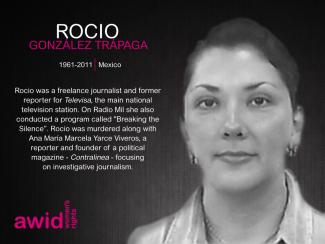
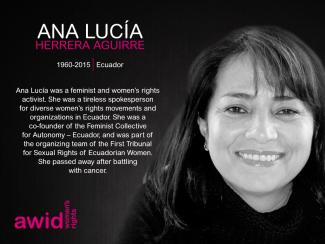
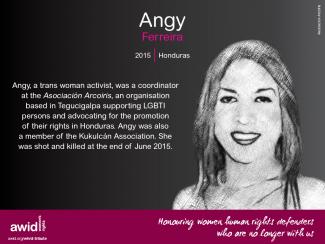
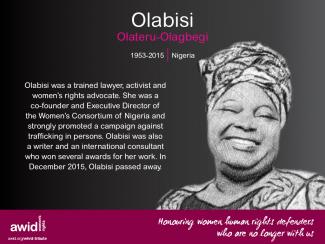

("exchange hand")
Term of the black communities of the Northern Cauca for the minga, the collective work based on solidarity and mutual support.
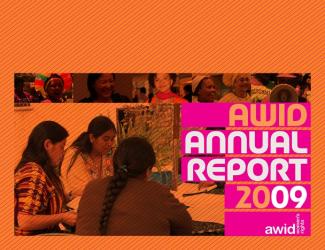
Our 2009 Annual Report includes highlights of another busy year of action and reflection at AWID as we implement our commitment to boldly, creatively and effectively contribute to the advancement of women’s rights and gender equality worldwide.
In the report you can find out about our programmatic achievements, membership, finances, what to watch out for in 2010, as well as information about our Board and Staff.
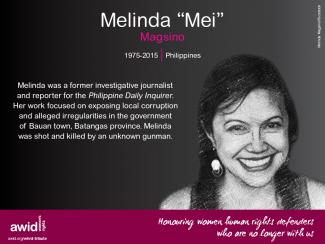

Sara AbuGhazal is a Palestinian feminist living in Beirut. She is a co-founder of Sawt al-Niswa, a collective that produces knowledge in Beirut. She is the co-director of The Knowledge Workshop, a feminist organization based in Beirut that works on feminist oral history and archiving. Sara is currently the Regional Coordinator of the Regional Coalition for Women Human Rights Defenders in the Middle East and North Africa.
Sara strives to help create spaces of feminist transformation and solidarity. Her work is mostly centered on building sustainable movements in the MENA region. She is invested in knowledge production, feminist transformation, and Palestine. She publishes regularly in sawtalniswa.org and her fiction also appears in Romman e-magazine.
Related Content
Front Line Defenders: Emilsen Manyoma Killed
ReliefWeb: A human rights defender killed every other day in 2017 in Colombia (between 1 and 23 January 2017)
Global Witness: Defenders of the Earth (2016 Report)
okayafrica.: Who is Killing Colombia's Black Human Rights Activists?
PBI Colombia: We will always accompany your work
Bitch Media: Don’t Touch My Crown: The failure of decapitation and the power of black women’s resistance


Veena Singh is a Fiji Islander, a feminist and a woman of colour. Veena was born and raised in a small rural town in Fiji and is of mixed ethnicity (her mum is an Indigenous Fijian woman and dad is Fijian of Indian descent). She is a feminist development practitioner and is a strong advocate of ‘shifting powers to create positive change’ and in ‘building an economy of kindness’. Her work experience has largely been in the areas of Human Rights, Gender Equality and Social Inclusion and she has more than 18 years of professional experience working specifically in women and children’s rights, Women, Peace and Security (UNSCR 1325), Human Security, Community Development and Community Media. Veena has worked and volunteered for several Fiji-based NGOs before joining SPC- Fiji Women’s Rights Movement, FemLINKPacific, Fiji Red Cross and Save the Children (Fiji).
Additionally, Veena has worked on a wide range of development areas and issues, including Access to Justice, Conflict Prevention and Peacebuilding, Sexual and Reproductive Health and Rights (SRHR), Women’s Political Participation, Leadership and in Decision Making, and more recently in the area of Gender Statistics. Her work has enabled her to work very closely with development practitioners, feminists, activists, government representatives, and peace practitioners across the Pacific, Asia, Europe, and African Region. Outside of the office, she likes to work on promoting and protecting the environment; raising awareness on positive mental health and wellbeing; and spending time on writing.
She is a mum to 11 cats, proud wearer of sarees and a collector of postcards. Veena is a thoughtful observer on the direction of feminist activities in Fiji and the Pacific region, and in her own organisations, and seeks, as she describes it, "to decolonise her mind and the ‘self’ through radical self-reflection" but more importantly for her, she cares about putting out more relatable writing that will connect her with the Pacific diaspora. Veena holds a Degree in Community Development with Murdoch University (Australia) and a Postgraduate Diploma in Social Policy with the Fiji National University
Related content
Telesur: Another Activist Murder Linked to Canadian Mining in Guatemala
Guatemala Human Rights Commission: Two Defenders Killed in January
IM Defensoras: Assailants kill territorial defender, Laura Leonor Vásquez
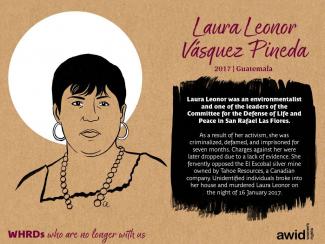
Khaoula Ksiksi is a passionate advocate for justice, equity, and liberation. As a Gender, Equality, Diversity, and Inclusion (GEDI) Advisor, she works to make inclusivity a lived reality, not just a policy, across humanitarian programs and crisis contexts. She collaborates with teams to challenge structural oppression using bold, transformative tools rooted in lived experience.
Her activism began on the frontlines of Tunisia’s anti-racism movement. With Mnemty, she helped push through the country’s first anti-discrimination law, forcing a national reckoning with racial injustice. She later co-founded Voices of Black Tunisian Women to amplify Black women’s leadership, build solidarity networks, and demand visibility in a society that often silences them.
Khaoula is also a founding member of Falgatna, a radical queer-feminist movement fighting for SOGIESC rights and supporting LGBTQI+ communities through direct action, digital resistance, and survivor-centered advocacy.
Previously, she led regional feminist and climate justice projects at the Rosa Luxemburg Foundation in North and West Africa.
At the heart of her work is a deep belief: no one is free until we all are. Her activism is both a fight and a love letter to her people, her communities, and the world we deserve.
